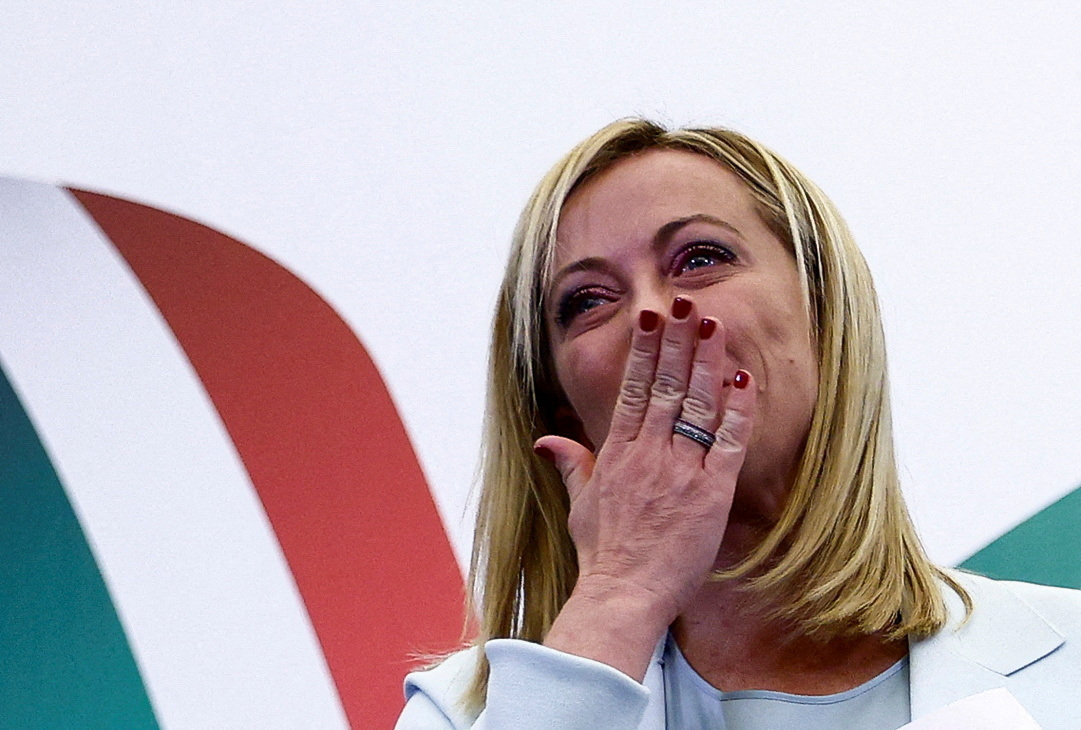
[elfsight_social_share_buttons id=”1″]
The conservative alliance that won Italy‘s national election will usher in a rare era of political stability to tackle an array of problems besieging the euro zone’s third-largest economy, one of its senior figures said on Monday.
Giorgia Meloni looks set to become Italy‘s first woman prime minister at the head of its most right-wing government since World War II after leading the conservative alliance to a triumph in Sunday’s election.
Matteo Salvini, leader of the League party that is one of the main allies of Meloni’s Brothers of Italy, shrugged off a poor showing by his own party and forecast an end to Italy‘s revolving-door governments.
“I expect that for at least five years we will press ahead without any changes, without any twists, prioritizing the things we need to do,” Salvini told a news conference.
Near final results showed the rightist bloc, which also includes Silvio Berlusconi’s Forza Italia, should have a solid majority in both houses of parliament, potentially ending years of upheaval and fragile coalitions.

The result is the latest success for the right in Europe after a breakthrough for the anti-immigration Sweden Democrats in an election this month and advances made by the National Rally in France in June.
“Italians have given us an important responsibility,” Meloni said in a social media post on Monday.
“It will now be our task not to disappoint them and do our utmost to restore dignity and pride to the nation,” she said, alongside a picture of her clutching the country’s flag.
Meloni, who has spoken out against what she calls “the LGBT lobby” and mass immigration, spoke about protecting family values and the identity and culture of conservatives and Christians at an event several years ago highlighting her platform on these and other issues.
Italy’s 1st woman prime minister is
B A S E D.
Chills watching this. pic.twitter.com/vKyiYFyN6g— Benny Johnson (@bennyjohnson) September 26, 2022
She has pledged to back Western policy on Ukraine and not take risks with Italy‘s fragile finances.
Tough inheritance
Meloni and her allies face a daunting list of challenges, including soaring energy prices, the war in Ukraine, and a renewed economic slowdown.
Her coalition government, Italy‘s 68th since 1946, is unlikely to be installed before the end of October and Prime Minister Mario Draghi remains at the head of a caretaker administration for now.
Despite the talk of stability, Meloni’s alliance is split on some highly sensitive issues that might be difficult to reconcile once in government.
Draghi, the former head of the European Central Bank, pushed Rome to the center of EU policy-making during his 18-month stint in office, forging close ties with Paris and Berlin.
In Europe, conservative opposition parties in Spain and France were the first to hail Meloni’s victory alongside national conservative governments in Poland and Hungary, which both have strained relations with Brussels.
With almost all results counted, the Brothers of Italy led with around 26% of the vote, up from just 4% in the last national election in 2018, supplanting the League as the driving force on the right.
The League took less than 9%, down from more than 17% four years ago, but despite the relatively low score, Salvini said he would stay on as party leader. Berlusconi’s Forza Italia scored around 8%.
Enrico Letta, the head of the main opposition party, the Democratic Party, announced he would stand down as leader.
With the clear-cut result, the vote was a ringing endorsement for the conservative bloc. Voter turnout, however, was just 64%, compared to 73% four years ago — a record low in a country that has historically had strong voter participation.
Copyright 2022 Thomson/Reuters. Edits and additions for FISM News by Jacob Fuller.
